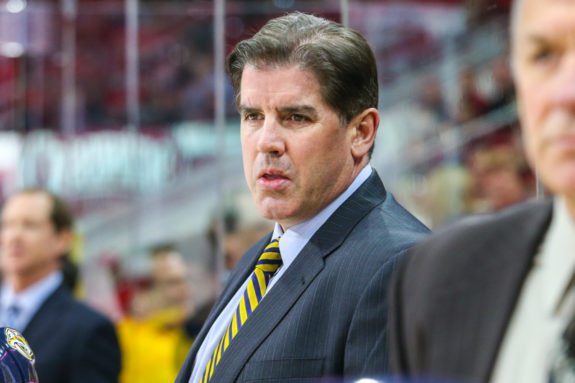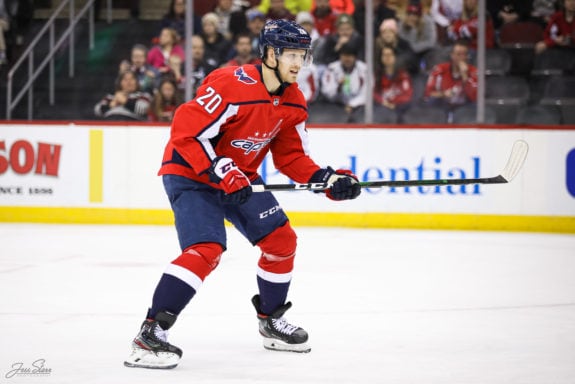It happened a few times in the regular season: the Washington Capitals held the lead in the third period, but defensive miscues led to the tying goal. Back in February, it happened against the Boston Bruins in back-to-back games. At least in those games, the Capitals came away with an overtime win and a loss. Earning a point in the regular season means that the mistakes weren’t that costly.
However, this is the playoffs, when there is no brief 3-on-3 play or a shootout to salvage a win; it’s a grind to the end. In Games 2 and 3 of their best-of-seven series against the Bruins, the Capitals have been undone by defensive miscues and have seen their third-period lead vanish. Both games resulted in defeats, and the Capitals now find themselves down 2-1 in the series.
Misplays and Miscues in Game 2
Taylor Hall’s game-tying goal in Game 2 began with a bad read by the Capitals on a zone entry. John Carlson tried to poke check the puck away from Hall, then tried to take Hall to the boards. Hall went around him, triggering an unfortunate chain reaction. Dmitri Orlov and TJ Oshie moved over to help, leaving Craig Smith and David Krejci completely unguarded. Smith took advantage of this and made his way unobstructed towards the front of the net. Orlov slid on his stomach to take Hall’s shot away, but Hall was able to find an open lane to get the puck to Smith. It was a small miracle that Smith missed the initial shot, but in the ensuing scrum, Hall banged the puck in.
Carlson should know better. There’s no excuse for his poor initial effort, challenging the zone entry. If he was giving his best effort on that play, then fatigue must have caused the error since there were roughly three minutes left in a game that he had already played 20+ demanding minutes. His final time on the ice (TOI) was 24:52, to lead all Capitals defenders.
RELATED: Capitals Undone by Third-Period Play in Back-to-Back Games
The Bruins’ Game 2 game-winning goal by Brad Marchand was a similarly innocuous play that became dangerous when compounded by a Capitals mistake. Marchand dumped the puck around the boards and the Capitals defender Brendan Dillon handled it cleanly. Then, for whatever reason, Dillon sent a muffin toward the blue line. We can’t even say the pass was intercepted by Krejci because Dillon sent it right to him. By the time he sent it across to Matt Grzelcyk, the Capitals’ zone was in chaos.
As shown in the video, Justin Schultz is out of position, Dillon is out of position, the only forward back is Tom Wilson, who’s wildly out of position. Schultz and Dillon can’t decide who should cover Pastrnak and who should cover Marchand, so they cover neither. Marchand received a pass with no Capitals player within ten feet of him, and he doesn’t tend to miss from the circle. Dillon has to be more responsible when clearing the puck, but the complete breakdown afterward is just as damning. The Capitals can’t make mistakes like that against the Bruins and expect to advance beyond the first round.
Ugly Mistakes Cost Game 3
Nic Dowd’s high sticking penalty on Charlie McAvoy showed poor judgment, but on the ensuing penalty kill, the Capitals were caught puck watching. After receiving a pass at the point, McAvoy skated in towards the net as two Capitals moved to challenge him, leaving Marchand all alone in the blue paint. Despite the challenge, McAvoy found an open seam to Patrice Bergeron, who was at the center of the Capitals’ “box” penalty kill formation. By the time the Caps had turned to engage Bergeron, the puck was headed towards the net, and Marchand batted it in for a goal.
That’s terrible penalty killing on their part, but, again, this happened with less than ten minutes left in the third period. The Bruins have been successful by keeping the game close and then pouncing on Capitals’ mistakes in the third. The overtime goal that decided Game 3 is another example.
It’s a routine play during a game. The puck is dumped in and the goaltender handles it, either winding it around the boards or settling it down for his defender. In this case, Ilya Samsonov lost track of the puck after its momentum stopped. However, Schultz was backchecking, so it shouldn’t have been a big deal. As Samsonov leisurely makes his way back to his crease, Schultz takes a weird angle to the puck and gets beat by Smith. Smith sweeps the puck away from Schultz and before Samsonov can realize what’s happening, it’s in the back of the net.
There is no excuse for this mistake either, but fatigue could have been a factor. Schultz finished the game with 29:06 of ice time.
System Not Producing Results
The demanding system that head coach Peter Laviolette has his defenders playing has contributed to these miscues all season. I’ve mentioned it often on Twitter and here. Laviolette wants his defenders to be extremely aggressive. In the offensive zone, he expects them to help the forecheck and pinch to generate more offense. In the defensive zone, he wants them to play a man-on-man system that requires hard skating and a lot of extra movement. By the time the game reaches its final ten minutes, his defenders must be feeling it; tired legs, tired bodies, and tired brains make mistakes.

The system is intended to generate enough offensively that it can offset playing with fatigue late in games. However, in three playoff games, the aggressive offensive zone approach has not resulted in enough goal production to offset that fatigue. Boston has a well-constructed roster, capable of grinding out games and counter-punching when they get their opportunities. Excellent goaltending from Tuukka Rask has also helped them weather the Capitals’ offensive attack. These factors have stunted the Capitals’ offense, and they are expending a lot of energy for few goals. Against the Bruins, this could be fatal.
Can Adjustments Be Made?
Laviolette showed an unwillingness to tinker with this system throughout the season, even when it cost the team a few games. In truth, he seems to have favored this system for the better part of a decade. If any adjustments are made, it will be to demand better defensive play from his depth forward lines. However, the loss of Lars Eller could put a damper on that plan. He’s one of the Capitals’ best defensive-minded centers and plays a key role in the defensive zone. In Game 3, Garnet Hathaway, Carl Hagelin, and Dowd stepped up to play big minutes defensively while chipping in a 5-on-5 goal. Unfortunately, their efforts alone weren’t enough to get the win.

Ultimately, the main “adjustment” that has to be made is to get pucks behind the Bruins goaltender. That’s the style of play that the team is built for. If fatigue is a factor, Laviolette should rest one or two of his defenders. The Capitals have the depth to insert fresh legs into the lineup and not have it negatively impact the team. I thought he might do that for Game 3, as Trevor van Riemsdyk and Martin Fehervary were given extra reps in morning practice before the game.
Daniel Sprong, Connor McMichael, Martin Fehervary and TvR are running drills for quite some time after Caps AM skate today.
— Samantha Pell (@SamanthaJPell) May 19, 2021
Both defenders are reliable when called upon. Fehervary is coming off another good season in the AHL, while van Riemsdyk got some minutes down the stretch and was impressive enough to earn a multi-year contract extension. I’m not sure whom Laviolette would scratch. Schultz has been involved in both overtime gaffs and is a ripe candidate to be scratched, but I’m not sure the team would go that far. It seems unlikely they will make any major personnel adjustments before Game 4.
Fresh legs on defense will not solve the goal-scoring problem, though. The team’s playoff leaders after three games are Dowd and Hathaway, with two goals apiece. Alex Ovechkin got on the board with a power-play goal in Game 3, but Anthony Mantha and Carlson have not scored yet. Nicklas Backstrom has been held off the scoresheet entirely. This has to change for the Capitals to advance beyond the Bruins.
What’s Next?
If the Capitals can bounce back and get some goal production, these defensive miscues will become blips on the radar. They are not new, and the coach and team seem content to try to work through them. The solution is simple: they have to score more goals. They’re in too deep to try anything else, and Laviolette has been inflexible throughout his career when it comes to systemic adjustments. Because of this, the series is in danger of mirroring the 2020 playoff matchup against the Islanders when former head coach Todd Reirden had no answers to counter New York’s game plan.
RELATED: Reirden’s Future With Capitals Has To Be in Trouble
If the Capitals can’t increase their offensive production, then they are likely to face elimination in Round 1 for the third season in a row. If that happens, I imagine we’ll see personnel changes rather than system changes. Laviolette has a multi-year contract, and only two members of his defensive corps (Orlov and Carlson) have any kind of trade protection. Management has shown that they are willing to trade valuable pieces to obtain players that fit their coach’s system better. If the team cannot find the answer within their current group to overcome the Bruins, the offseason conversation will begin sooner than later.